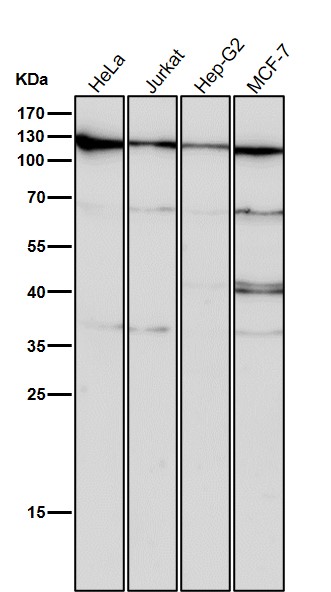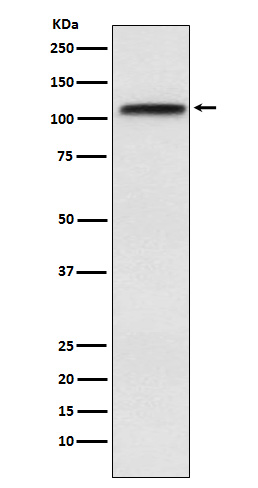

| WB | 咨询技术 | Human,Mouse,Rat |
| IF | 咨询技术 | Human,Mouse,Rat |
| IHC | IHC:1/100-1/200;IHF:1/50-1/200 | Human,Mouse,Rat |
| ICC | 1/50-1/200 | Human,Mouse,Rat |
| FCM | 1/20-1/100 | Human,Mouse,Rat |
| Elisa | 咨询技术 | Human,Mouse,Rat |
| Aliases | CRM 1; emb; Exp1; Exportin1; XPO 1;;Exportin 1 |
| WB Predicted band size | Calculated MW: 123 kDa ; Observed MW: 110 kDa |
| Host/Isotype | Rabbit IgG |
| Antibody Type | Primary antibody |
| Storage | Store at 4°C short term. Aliquot and store at -20°C long term. Avoid freeze/thaw cycles. |
| Species Reactivity | Human,Mouse,Rat |
| Immunogen | A synthesized peptide derived from human Exportin 1 |
| Formulation | Purified antibody in PBS with 0.05% sodium azide,0.05% BSA and 50% glycerol. |
+ +
以下是关于CRM1(Exportin-1)抗体的3篇代表性文献,包含名称、作者及摘要要点:
---
1. **文献名称**:*Selinexor (KPT-330), a selective inhibitor of nuclear export, prevents Ebola virus replication and pathogenesis in vivo*
**作者**:Karyopharm Therapeutics Inc. (Chachulski et al.)
**摘要**:该研究报道了CRM1抑制剂Selinexor通过阻断病毒蛋白的核质运输,抑制埃博拉病毒复制,并在动物模型中显著降低病毒载量和死亡率,证明了CRM1抗剂在抗病毒治疗中的潜力。
2. **文献名称**:*CRM1 inhibition induces cytotoxic neoantigen presentation via elevated expression of SP140*
**作者**:J. Borden et al.
**摘要**:研究发现CRM1抑制剂(如KPT-330)通过上调SP140蛋白表达,增强肿瘤细胞表面新抗原呈递,从而激活T细胞免疫应答,为CRM1靶向药物与免疫治疗的联合应用提供了机制支持。
3. **文献名称**:*Structural basis of CRM1-cargo recognition, inhibition and nuclear pore complex interaction*
**作者**:M. Hüls et al.
**摘要**:通过冷冻电镜解析CRM1与抑制剂(如Leptomycin B)的复合物结构,揭示了CRM1识别底物及被抑制的分子机制,为设计高选择性抗剂提供了结构基础。
---
**备注**:CRM1抗剂(如Selinexor)已获批用于多发性骨髓瘤等癌症治疗,相关研究涵盖抗肿瘤、抗病毒及免疫调节等多个领域。如需扩展特定方向文献,可进一步补充。
CRM1 (Chromosomal Region Maintenance 1), also known as Exportin-1 or XPO1. is a key nuclear export receptor responsible for transporting proteins and RNA molecules containing nuclear export signals (NES) from the nucleus to the cytoplasm. It plays a critical role in regulating nucleocytoplasmic transport, cell cycle progression, and stress responses. Dysregulation of CRM1 is implicated in various cancers, where its overexpression leads to the aberrant cytoplasmic export of tumor suppressor proteins (e.g., p53. BRCA1) and oncogenic RNAs, promoting tumor survival and drug resistance.
CRM1 antibodies are essential tools for studying its expression, localization, and interactions in cellular contexts. They are widely used in techniques like Western blotting, immunohistochemistry, and immunofluorescence to investigate CRM1's role in cancer biology and therapeutic targeting. In research, these antibodies help validate CRM1 inhibition strategies, such as small-molecule inhibitors (e.g., Selinexor/KPT-330), which block NES-binding pockets to restore nuclear retention of tumor suppressors.
Therapeutically, anti-CRM1 monoclonal antibodies are under exploration for direct inhibition or as delivery vehicles for cytotoxic agents in CRM1-overexpressing cancers. Recent studies also highlight their potential as biomarkers for predicting treatment response. Despite progress, challenges remain in optimizing antibody specificity and minimizing off-target effects. CRM1 antibodies thus represent both a research cornerstone and a promising avenue for targeted cancer therapies.
×